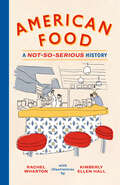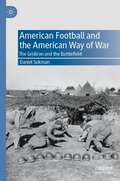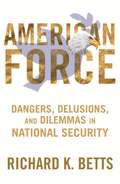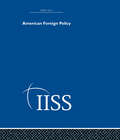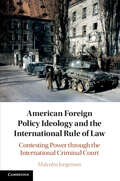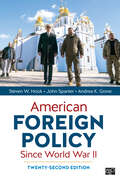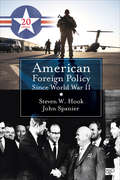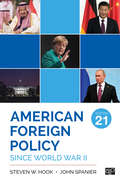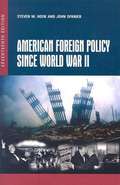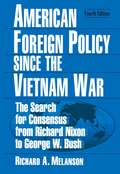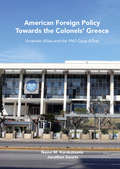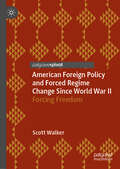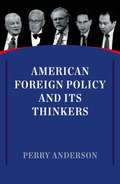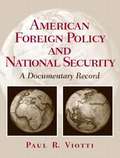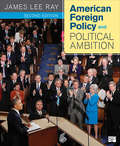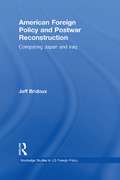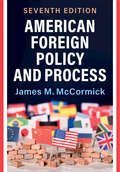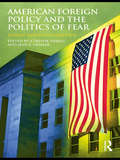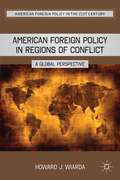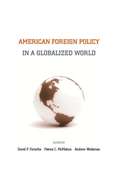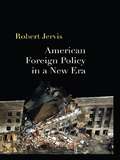- Table View
- List View
American Food: A Not-So-Serious History
by Rachel WhartonAn illustrated journey through the lore and little-known history behind ambrosia, Ipswich clams, Buffalo hot wings, and more. This captivating and surprising tour of America’s culinary canon celebrates the variety, charm, and occasionally dubious lore of the foods we love to eat, as well as the under-sung heroes who made them. Every chapter, organized from A to Z, delves into the history of a classic dish or ingredient, most so common—like ketchup—that we take them for granted. These distinctly American foods, from Blueberries and Fortune Cookies to Pepperoni, Hot Wings, Shrimp and Grits, Queso, and yes, even Xanthan Gum, have rich and complex back stories that are often hidden in plain sight, lost to urban myth and misinformation. American Food: A Not-So-Serious History digs deep to tell the compelling tales of some of our most ordinary foods and what they say about who we are—and who, perhaps, we are becoming.
American Football and the American Way of War: The Gridiron and the Battlefield
by Daniel SukmanThis book provides the reader with a history on the linkages between American Football and the American Way of War. It provides concise summaries of aspects of tactics, operations, and strategy, as well as international relations theory using football as a metaphor to simplify the concepts. International relations theory and military strategy tend to be complicated subjects often explained with jargon that puts the average reader to sleep. A book about war and foreign policy explained through football analogies and comparisons is designed to liven the topic and explain various military theories, strategies, and concepts. War and football tend to dominate national media. War is often a topic of debate from the highest levels of government to local bars and coffeehouses. Football is the monolith of sports that blankets sports television and radio throughout the year. This book provides the reader an understanding of how military professionals formulate and execute strategy in an easily understandable manner.
American Force
by Richard K. BettsWhile American national security policy has grown more interventionist since the Cold War, Washington has also hoped to shape the world on the cheap. Misled by the stunning success against Iraq in 1991, administrations of both parties have pursued ambitious aims with limited force, committing the country's military frequently yet often hesitantly, with inconsistent justification. These ventures have produced strategic confusion, unplanned entanglements, and indecisive results. This collection of essays by Richard K. Betts, a leading international politics scholar, investigates the use of American force since the end of the Cold War, suggesting guidelines for making it more selective and successful. Betts brings his extensive knowledge of twentieth century American diplomatic and military history to bear on the full range of theory and practice in national security, surveying the Cold War roots of recent initiatives and arguing that U. S. policy has always been more unilateral than liberal theorists claim. He exposes mistakes made by humanitarian interventions and peace operations; reviews the issues raised by terrorism and the use of modern nuclear, biological, and cyber weapons; evaluates the case for preventive war, which almost always proves wrong; weighs the lessons learned from campaigns in Iraq, Afghanistan, and Vietnam; assesses the rise of China and the resurgence of Russia; quells concerns about civil-military relations; exposes anomalies within recent defense budgets; and confronts the practical barriers to effective strategy. Betts ultimately argues for greater caution and restraint, while encouraging more decisive action when force is required, and he recommends a more dispassionate assessment of national security interests, even in the face of global instability and unfamiliar threats.
American Force: Dangers, Delusions, and Dilemmas in National Security (A Council on Foreign Relations Book)
by Richard BettsWhile American national security policy has grown more interventionist since the Cold War, Washington has also hoped to shape the world on the cheap. Misled by the stunning success against Iraq in 1991, administrations of both parties have pursued ambitious aims with limited force, committing the country's military frequently yet often hesitantly, with inconsistent justification. These ventures have produced strategic confusion, unplanned entanglements, and indecisive results. This collection of essays by Richard K. Betts, a leading international politics scholar, investigates the use of American force since the end of the Cold War, suggesting guidelines for making it more selective and successful.Betts brings his extensive knowledge of twentieth century American diplomatic and military history to bear on the full range of theory and practice in national security, surveying the Cold War roots of recent initiatives and arguing that U.S. policy has always been more unilateral than liberal theorists claim. He exposes mistakes made by humanitarian interventions and peace operations; reviews the issues raised by terrorism and the use of modern nuclear, biological, and cyber weapons; evaluates the case for preventive war, which almost always proves wrong; weighs the lessons learned from campaigns in Iraq, Afghanistan, and Vietnam; assesses the rise of China and the resurgence of Russia; quells concerns about civil-military relations; exposes anomalies within recent defense budgets; and confronts the practical barriers to effective strategy. Betts ultimately argues for greater caution and restraint, while encouraging more decisive action when force is required, and he recommends a more dispassionate assessment of national security interests, even in the face of global instability and unfamiliar threats.
American Foreign Policy (Adelphi Papers Reissue Hardback)
by variousComplete set Since 1961 the Adelphi Papers have provided some of the most informed accounts of international and strategic relations. Produced by the world renowned International Institute of Strategic Studies, each paper provides a short account of a subject of topical interest by a leading military figure, policy maker or academic. The project reprints the first forty years of papers, arranged into thematic sets. The collection as a whole provides a rich and insightful account of international affairs during a period which spans the second half of the Cold War, the fall of the communist bloc and the emergence of a new regime with the United States as the sole superpower. There is a wealth of global coverage: Four volumes on east and southeast Asia as well as individual volumes on China, Japan and Korea Particular attention is given to the Middle East, with volumes addressing internal sources of instability; geo-politics and the role of the superpowers; the Israel-Palestine conflict; and the Iran-Iraq War and the first Gulf War. There is also a volume on oil and insecurity There are also two volumes on Africa, the site of most of the world’s wars during the period. The IISS has obviously made a particular contribution to the understanding of military strategy, and this is reflected with material on topics such as urban and guerrilla warfare, nuclear deterrence and the role of information in modern warfare. Volumes on military strategy are complemented by approaches from other disciplines, such as defence economics. Key selling points: Early papers were only distributed by the IISS and will have achieved limited penetration of the academic market A host of major authors on a range of different subjects (eg Gerald Segal on China, Michael Leifer on Southeast Asia, Sir Lawrence Freidman on the revolution in military affairs, Raymond Vernon on multinationals and defence economics) Individual volumes will have a strong appeal to different markets (eg the volume on defence economics for economists, various volumes for Asian Studies etc)
American Foreign Policy Ideology and the International Rule of Law: Contesting Power through the International Criminal Court
by Malcolm JorgensenAmerican engagement with international law has long been framed by commitment to the 'international rule of law', which persists even across divergent political and historical eras. Yet, despite appeals to legal ideals, American international law policy is consistently criticised as fraught with contradiction and distorted by beliefs in 'exceptionalism'. These contested claims of fidelity to law are the subject of this book: what does the 'international rule of law' mean for American legal policymakers even as they advocate competing commitments to international legal order? Answers are found in extensive evidence that American policymakers receive international law through established foreign policy ideologies, which correspond with divisions in both legal scholarship and diplomatic history. Using the case of the International Criminal Court, the book demonstrates that the very meaning of the international rule of law is structured by competing ideological beliefs; between American policymakers and global counterparts, and among American policymakers themselves.
American Foreign Policy Since World War II
by Steven W. Hook John W. Spanier Andrea K. GroveNow in its Twenty-Second Edition, Hook, Spanier, and Grove’s American Foreign Policy Since World War II has long set the standard in guiding students through the complexities of American foreign policy. The text introduces students to the American "style" of foreign policy, imbued with a distinct sense of national exceptionalism. By giving students the historical context they need, this book allows them to truly grasp the functions and dysfunctions of the nation’s foreign policy agenda with historical insight into modern policy context.
American Foreign Policy Since World War II
by Steven W. Hook John W. Spanier Andrea K. GroveNow in its Twenty-Second Edition, Hook, Spanier, and Grove’s American Foreign Policy Since World War II has long set the standard in guiding students through the complexities of American foreign policy. The text introduces students to the American "style" of foreign policy, imbued with a distinct sense of national exceptionalism. By giving students the historical context they need, this book allows them to truly grasp the functions and dysfunctions of the nation’s foreign policy agenda with historical insight into modern policy context.
American Foreign Policy Since World War II
by Steven W. Hook John W. SpanierSteven Hook and John Spanier’s classic text, American Foreign Policy Since World War II, celebrates its Twentieth Edition. It has remained the standard for guiding students through the complexities of American foreign policy by showing how recent developments confirm the book’s overarching theme—that there is an American “style” of foreign policy imbued with a distinct sense of national exceptionalism. Giving students important historical context, the book allows them to grasp the functions and frequent dysfunctions of the nation’s evolving foreign policy agenda. In this new edition, chapters covering the end of the Cold War have been combined and streamlined, making room for a new chapter that examines the aftershocks of the Arab Spring, political breakdowns in Iraq and Afghanistan, and the rise of the Islamic State. The final chapter considers the revival of power politics in world politics, with Russia and China stepping up their attempts to weaken the United States and create a multipolar world. The book ends by reconsidering America’s distinctive style of foreign policy and its resilience amid such turbulence since World War II.
American Foreign Policy Since World War II
by Steven W. Hook John W. SpanierSteven Hook and John Spanier’s classic text, American Foreign Policy Since World War II, celebrates its Twentieth Edition. It has remained the standard for guiding students through the complexities of American foreign policy by showing how recent developments confirm the book’s overarching theme—that there is an American “style” of foreign policy imbued with a distinct sense of national exceptionalism. Giving students important historical context, the book allows them to grasp the functions and frequent dysfunctions of the nation’s evolving foreign policy agenda. In this new edition, chapters covering the end of the Cold War have been combined and streamlined, making room for a new chapter that examines the aftershocks of the Arab Spring, political breakdowns in Iraq and Afghanistan, and the rise of the Islamic State. The final chapter considers the revival of power politics in world politics, with Russia and China stepping up their attempts to weaken the United States and create a multipolar world. The book ends by reconsidering America’s distinctive style of foreign policy and its resilience amid such turbulence since World War II.
American Foreign Policy Since World War II
by Steven W. Hook John W. SpanierThe Gold Standard for Textbooks on American Foreign Policy American Foreign Policy Since World War II provides you with an understanding of America’s current challenges by exploring its historical experience as the world’s predominant power since World War II. Through this process of historical reflection and insight, you become better equipped to place the current problems of the nation’s foreign policy agenda into modern policy context. With each new edition, authors Steven W. Hook and John Spanier find that new developments in foreign policy conform to their overarching theme—there is an American “style” of foreign policy imbued with a distinct sense of national exceptionalism. This Twenty-First Edition continues to explore America’s unique national style with chapters that address the aftershocks of the Arab Spring and the revival of power politics. Additionally, an entirely new chapter devoted to the current administration discusses the implications of a changing American policy under the Trump presidency.
American Foreign Policy Since World War II
by Steven W. Hook John W. SpanierThe Gold Standard for Textbooks on American Foreign Policy American Foreign Policy Since World War II provides you with an understanding of America’s current challenges by exploring its historical experience as the world’s predominant power since World War II. Through this process of historical reflection and insight, you become better equipped to place the current problems of the nation’s foreign policy agenda into modern policy context. With each new edition, authors Steven W. Hook and John Spanier find that new developments in foreign policy conform to their overarching theme—there is an American “style” of foreign policy imbued with a distinct sense of national exceptionalism. This Twenty-First Edition continues to explore America’s unique national style with chapters that address the aftershocks of the Arab Spring and the revival of power politics. Additionally, an entirely new chapter devoted to the current administration discusses the implications of a changing American policy under the Trump presidency.
American Foreign Policy Since World War II (17th Edition)
by Steven W. Hook John SpanierThe United States remains engaged in an open-ended "war on terrorism" with no foreseeable endpoint.
American Foreign Policy Since the Vietnam War: The Search for Consensus from Nixon to Clinton
by Richard A MelansonThis book integrates the study of presidential politics and foreign policy-making from the Vietnam aftermath to the events following September 11 and the Iraqi War. Focusing on the relationship between presidents' foreign policy agendas and domestic politics, it offers compelling portraits of presidents Nixon, Carter, Reagan, Bush I, Clinton, and Bush II. In the course of comparing the efforts of these presidents to articulate a clear conception of the national interest and to forge a foreign policy consensus, the author shows the key role of public opinion in constraining presidential initiatives, in particular the decision to use military force overseas. Never more timely, this popular text is appropriate for courses in U.S. foreign policy, the presidency, or contemporary U.S. politics.
American Foreign Policy Towards the Colonels' Greece: Uncertain Allies And The 1967 Coup D'état
by Jonathan Swarts Neovi M. KarakatsanisThis book seeks to comprehensively analyze and document U.S. foreign policy toward a strategic Cold War ally that posed a stark challenge to the traditionally-stated U.S. preference for democracy and political freedom. It details the complex ways in which the U.S. reacted to that challenge and went about crafting policies of longer-term accommodation with a regime it wished to retain as a close ally in a strategically important part of the world.
American Foreign Policy and Forced Regime Change Since World War II: Forcing Freedom
by Scott WalkerThis book explores the motivations behind American military interventions in the Post-World War II era that purported to replace autocratic regimes with democratic ones. It delves into the Forced Democracy (FD) phenomenon, focusing on its intellectual roots and previous attempts to study it in the academic literature. The author examines five American interventions that attempted to replace autocratic regimes with democratic ones—The Dominican Republic, Grenada, Panama, Afghanistan, and Iraq. Each chapter includes a history of the intervention and an assessment of whether America’s intentions and actions toward that particular country were actually focused on delivering a democratic outcome.
American Foreign Policy and Its Thinkers
by Perry AndersonMagisterial account of the ideas and the figures who have forged the American Empire.Since the birth of the nation, impulses of empire have been close to the heart of the United States. How these urges interact with the way the country understands itself, and the nature of the divergent interests at work in the unfolding of American foreign policy, is a subject much debated and still obscure. In a fresh look at the topic, Anderson charts the intertwined historical development of America's imperial reach and its role as the general guarantor of capital.The internal tensions that have arisen are traced from the closing stages of the Second World War through the Cold War to the War on Terror. Despite the defeat and elimination of the USSR, the planetary structures for warfare and surveillance have not been retracted but extended. Anderson ends with a survey of the repertoire of US grand strategy, as its leading thinkers--Brzezinski, Mead, Kagan, Fukuyama, Mandelbaum, Ikenberry, Art and others--grapple with the tasks and predicaments of the American imperium today.From the Hardcover edition.
American Foreign Policy and National Security: A Documentary Record
by Paul R. ViottiThis annotated and edited anthology brings together the documents most closely related to the making of American foreign and national security policy. It focuses on the Constitutional context; the organizational context; strategy, doctrine, and policy; arms control and disarmament; and multilateralism in terms of security, economy, and identity. The U. S. Constitution, Foreign Policy and National Security. Legislative-Executive Authority. The Constitutional Allocation of War Powers. Foreign Policy and National Security in the Executive Branch. Before World War II. World War II. The Cold War. Nuclear Weapons, Deterrence and Foreign Policy. Controlling Armaments. Spatial Limits: Geographic or Locational Approaches to Arms Control. Functional Approaches to Conflict and Arms Control. Global Organizations. Collective Security and Collective Defense. The Environment and the Economy. Human Rights. For anyone interested in American Foreign Policy, Defense Policy, Foreign Policy Making.
American Foreign Policy and Political Ambition
by James L. RayIn his eagerly-awaited second edition of American Foreign Policy and Political Ambition, James Ray revisits his deceptively simple premise that the highest priority of leaders is to stay in power. Looking at how political ambition and domestic pressures impact foreign policymaking is the key to understanding how and why foreign policy decisions are made. The text begins by using this analytic approach to look at the history of foreign policymaking and then examines how various parties inside and outside government influence decision making. In a unique third section, the book takes a regional approach, not only covering trends other books tend to miss, but giving students the opportunity to think comprehensively about how issues intersect around the globe—from human security and democratization, to globalization and pollution. Guided by input from adopters and reviewers, Ray has thoroughly re-organized the book and streamlined some coverage to better consolidate the historical, institutional, regional, and topical chapters and focus the thematic lens of the book. Ray has also brought the book fully up-to-date, addressing the latest events in American foreign policy, including the wars in Afghanistan and Iraq, the killing of Bin Laden, the WikiLeaks scandal and its aftermath, the impact of social media on foreign policy and world affairs, nuclear proliferation, developments in U.S.-Russian relations, climate change, and more.
American Foreign Policy and Postwar Reconstruction: Comparing Japan and Iraq (Routledge Studies in US Foreign Policy)
by Jeff BridouxOn the eve of the invasion of Iraq, President G.W. Bush argued that if setting up democracy in Japan and Germany after WW II was successful, then it should also be successful in Iraq. This book provides a detailed comparison of the reconstruction of Japan from 1945 to 1952 with the current reconstruction of Iraq, evaluating the key factors affecting the success or failure of such projects. The book seeks to understand why American officials believed that extensive social reengineering aiming at seeding democracy and economic development is replicable, through identifying factors explaining the outcome of U.S.-led post-conflict reconstruction projects. The analysis reveals that in addition to the effective use of material resources of power, the outcome of reconstruction projects depends on a variety of other intertwined factors, and Bridoux provides a new analytical framework relying on a Gramscian concept of power to develop a greater understanding of these factors, and the ultimate success or failure of these reconstruction projects. Appraising the effectiveness of American power in the contemporary international structure, this work is a significant contribution to the field and will be of great interest to all scholars of foreign policy, international relations and conflict studies.
American Foreign Policy and The Politics of Fear: Threat Inflation since 9/11 (Routledge Global Security Studies)
by A. Trevor Thrall Jane K. CramerThis edited volume addresses the issue of threat inflation in American foreign policy and domestic politics. The Bush administration's aggressive campaign to build public support for an invasion of Iraq reheated fears about the president's ability to manipulate the public, and many charged the administration with 'threat inflation', duping the news media and misleading the public into supporting the war under false pretences. Presenting the latest research, these essays seek to answer the question of why threat inflation occurs and when it will be successful. Simply defined, it is the effort by elites to create concern for a threat that goes beyond the scope and urgency that disinterested analysis would justify. More broadly, the process concerns how elites view threats, the political uses of threat inflation, the politics of threat framing among competing elites, and how the public interprets and perceives threats via the news media. The war with Iraq gets special attention in this volume, along with the 'War on Terror'. Although many believe that the Bush administration successfully inflated the Iraq threat, there is not a neat consensus about why this was successful. Through both theoretical contributions and case studies, this book showcases the four major explanations of threat inflation -- realism, domestic politics, psychology, and constructivism -- and makes them confront one another directly. The result is a richer appreciation of this important dynamic in US politics and foreign policy, present and future. This book will be of much interests to students of US foreign and national security policy, international security, strategic studies and IR in general. Trevor Thrall is Assistant Professor of Political Science and directs the Master of Public Policy program at the University of Michigan - Dearborn. Jane Kellett Cramer is an Assistant Professor of Political Science at the University of Oregon.
American Foreign Policy in Regions of Conflict
by Howard J. WiardaAmerica's regional foreign policy priorities are shifting, toward Asia, the Middle East, Latin America, and Africa, and away from Europe and Russia. Wiarda examines these changes and the reasons for them in each of these regional areas in this comprehensive work on global perspective on American foreign policy. Designed as a text for introductory international relations, foreign policy, comparative politics, and world politics courses, this book succeeds in integrating these often separate subfields and shows how the study of comparative politics can enlighten foreign policy.
American Foreign Policy in a Globalized World
by David P. Forsythe Andrew Wedeman Patrice C. MacMahonIn this volume, several leading foreign policy and international relations experts consider the long term prospects and implications of US foreign policy as it has been shaped and practiced during the presidency of George W. Bush. The essays in this collection - based on the research of well-respected scholars such as Ole Holsti, Loch Johnson, John Ruggie, Jack Donnelly, Robert Leiber, Karen Mingst, and Edward Luck - offer a clear assessment: while US resources are substantial, Washington's ability to shape outcomes in the world is challenged by its expansive foreign policy goals, its exceptionalist approach to international relations, serious questions about the limits of its hard power resources as well as fundamental changes in the global system. Illustrating one of the central ironies of the contemporary situation in foreign affairs and international relations: that at the very time of the ‘unipolar moment,’ the world has become globalized to such an extent that the unilateralism of the Bush Administration leads as much to resistance as it does to coercion, compliance, and cooperation. American Foreign Policy in a Globalized World will be of interest to students and scholars of politics and international relations.
American Foreign Policy in a New Era
by Robert JervisTo say that the world changed drastically on 9/11 has become a truism and even a cliché. But the incontestable fact is that a new era for both the world and US foreign policy began on that infamous day and the ramifications for international politics have been monumental.In this book, one of the leading thinkers in international relations, Robert Jervis, provides us with several snapshots of world politics over the past few years. Jervis brings his acute analysis of international politics to bear on several recent developments that have transformed international politics and American foreign policy including the War on Terrorism; the Bush Doctrine and its policies of preventive war and unilateral action; and the promotion of democracy in the Middle East (including the Iraq War) and around the world. Taken together, Jervis argues, these policies constitute a blueprint for American hegemony, if not American empire. All of these events and policies have taken place against a backdrop equally important, but less frequently discussed: the fact that most developed nations, states that have been bitter rivals, now constitute a "security community" within which war is unthinkable.American Foreign Policy in a New Era is a must read for anyone interested in understanding the policies and events that have shaped and are shaping US foreign policy in a rapidly changing and still very dangerous world.
